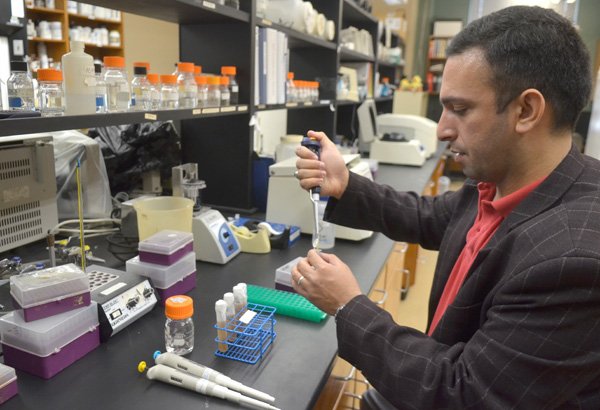FAYETTEVILLE — International students at the University of Arkansas account for about one-third of the $75.1 million economic impact of foreign scholars statewide, according to a November report by a nonprofit that focuses on international education. Those students contributed about $25.4 million to Northwest Arkansas’ economy last year, according to the International Institute on Education. Nationally, foreign students contributed nearly $19 billion to the economy, the report said.
The economic-impact study accounts only for direct spending on tuition, living expenses and dependent expenses and subtracts support from U.S. sources, such as scholarships. The economic analysis wasperformed by NAFSA: Association of International Educators, using the institute’s data.
“When students come over here, they will spend so much money,” said Adnan Al-Rubaye of Iraq, who is pursuing a doctorate in cell and molecular biology. He has more than two years left to study before earning his degree, then plans to return to Iraq.
Al-Rubaye is among 1,156 international students at the Fayetteville campus, about 5.4 percent of the 21,406 student population in fall 2010.
Universities nationwide focus on recruiting foreign students to increase enrollment and bring in outside money, said Allan Goodman, the institute’s president.
According to the study, about 70 percent of all funding for international students comes from sources outside the U.S., including the students’ families and home countries or universities.
UA is uniquely positioned to attract foreign students, Goodman said, mentioning the influence of Wal-Mart Stores Inc., Arkansas’ late U.S. Sen. J. William Fulbright and former President Bill Clinton.
“Everybody has heard of Wal-Mart, everybody has heard of Fulbright, everybody has heard of Clinton. What they don’t realize is that it’s all in Arkansas,” Goodman said.
Fulbright, chairman of the Senate Foreign Relations Committee from 1959 to 1975, helped establish the international Fulbright Scholar Program.
The overall number of foreign students studying in the United States has continued to rise, despite a recession that hit countries worldwide, the institute reported.
UA began aggressively trying to increase the number of international students in themid-1990s as more companies required employees to deal with businesses overseas, said Todd Shields, interim dean of the Graduate School, within which all international students study.
Shields said the state’s largest research institution has come a long way in its effortsto attract qualified foreign students.
To be more competitive with schools like Auburn University in Alabama, UA has expanded its language center and increased internationally focused classes, built its reputation as a research institution and promoted its business programs, Shields said. Business and management studies are the most popular fields for international students studying in the U.S., according to the institute.
The number of foreign students at UA increased from 850 in fall 2000 to 1,156 in fall 2010, said Michael Freeman, director of the international students and scholars office. That growth is part of a broader effort to increase overall enrollment, he said.
UA had the most foreign students of all the state’s universities and colleges, the institute found. Others with the highest international student populations were: University of Central Arkansas in Conway, 602; Southern Arkansas University in Magnolia, 123; Northwest Arkansas Community College in Bentonville, 94; and Hendrix College in Conway, 61.
Freeman said UA is actively recruiting students from specific countries like China to provide other students accessto cultures that are experiencing major growth and impacting global business.
This fall, the top five countries represented at UA were India, China, South Korea, Japan and Bolivia - in contrast to the 1980s, when Iran, Nigeria and Malaysia contributed the most foreign scholars, Freeman said.
None of the international students displaced Arkansas students, Shields said.
State lawmakers recognized the economic gain the state sees from international students in 2007, when legislators passed a House concurrent resolution to encourage universities to promote international education. The state Department of Higher Education routinely promotes the idea that foreign students are good for domestic students’ education and the economy, said its spokesman, Brandi Hinkle.
After Al-Rubaye graduates, he plans to return to Iraq to teach at a university, but he will likely talk to others who will come to the University of Arkansas, he said. He hopes to return for at least a visit after he graduates.
“We love Fayetteville,” he said. “The people are really nice over here. It’s a huge, huge difference between what we have in our country and what we have here.”
Northwest Arkansas, Pages 7 on 02/28/2011

